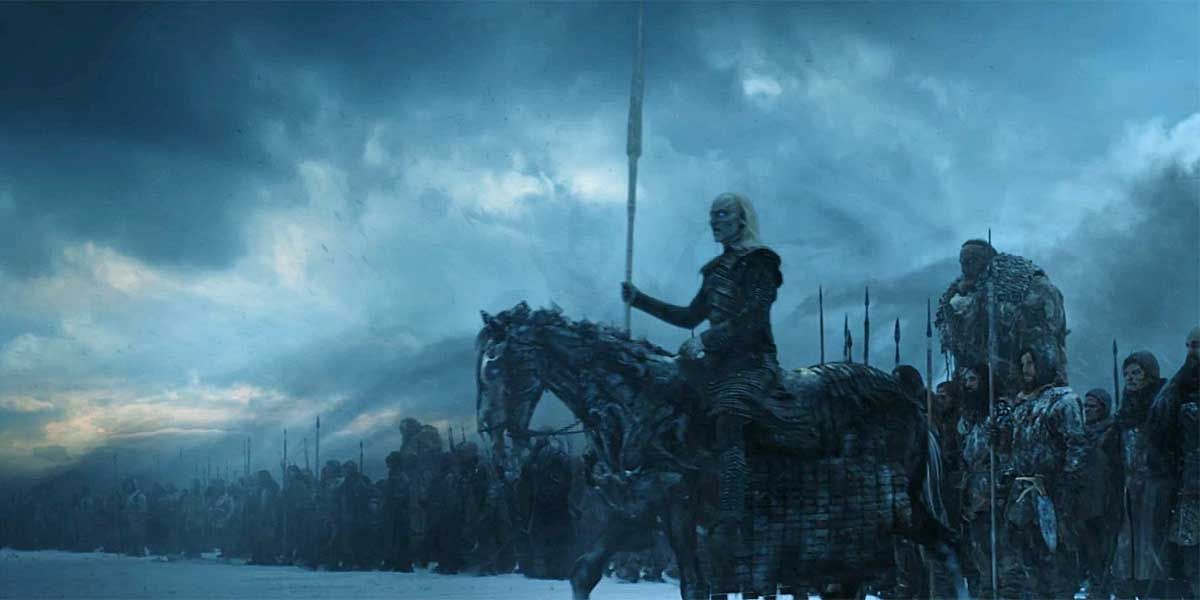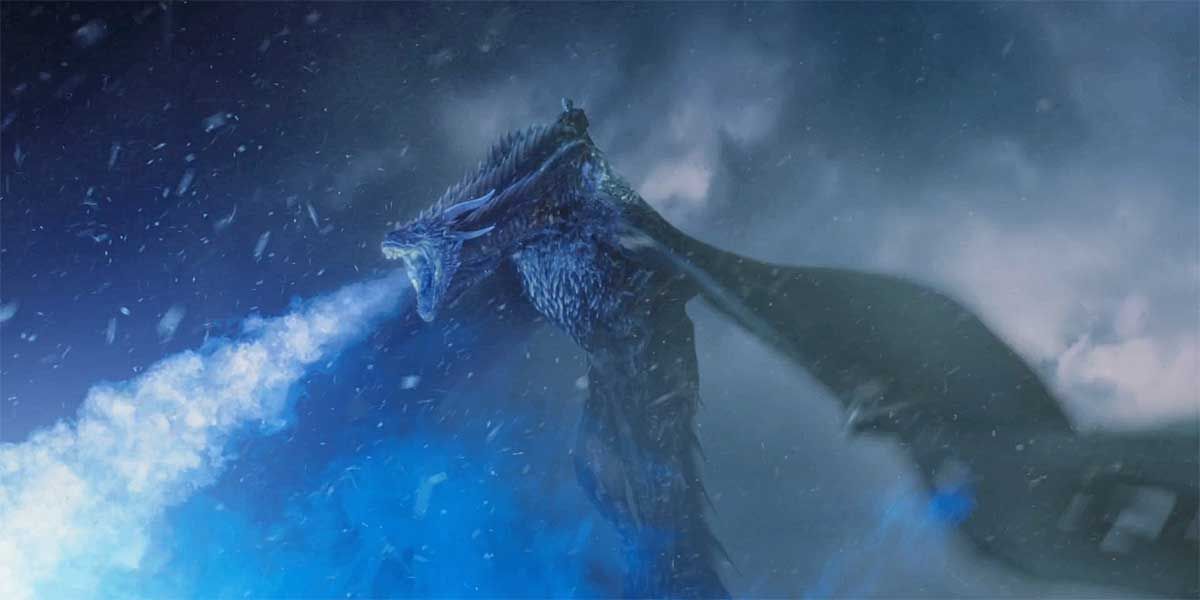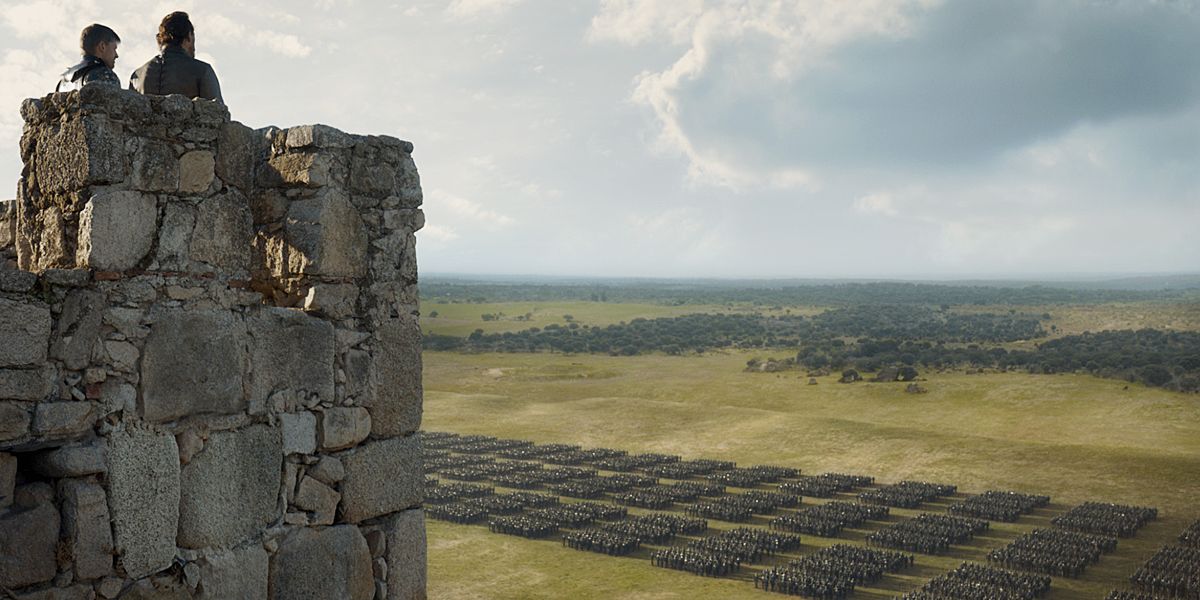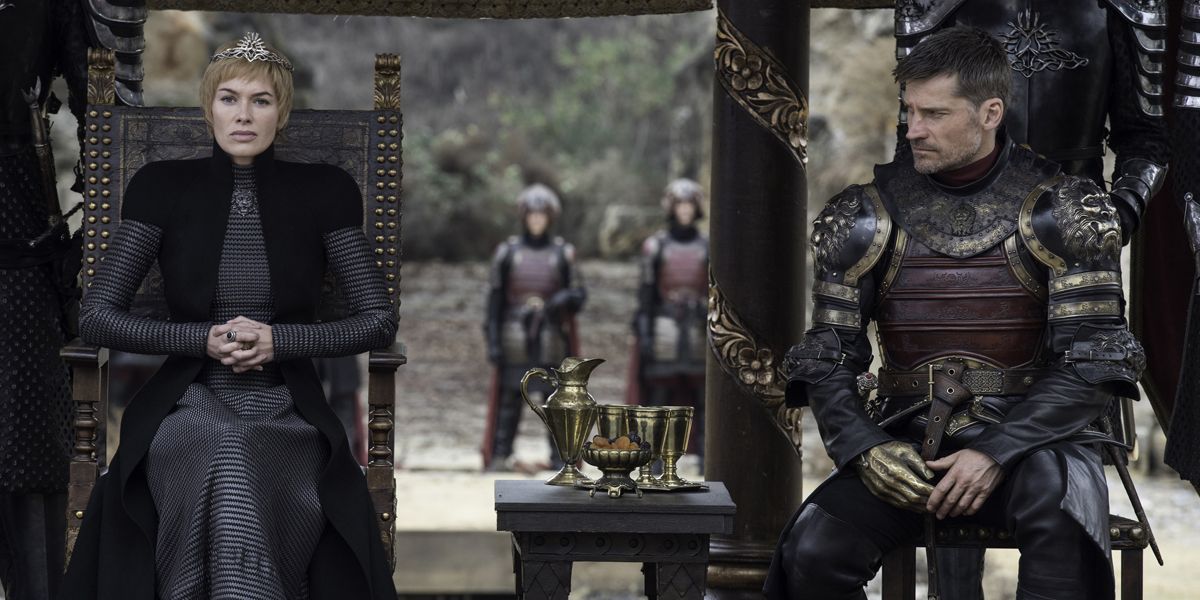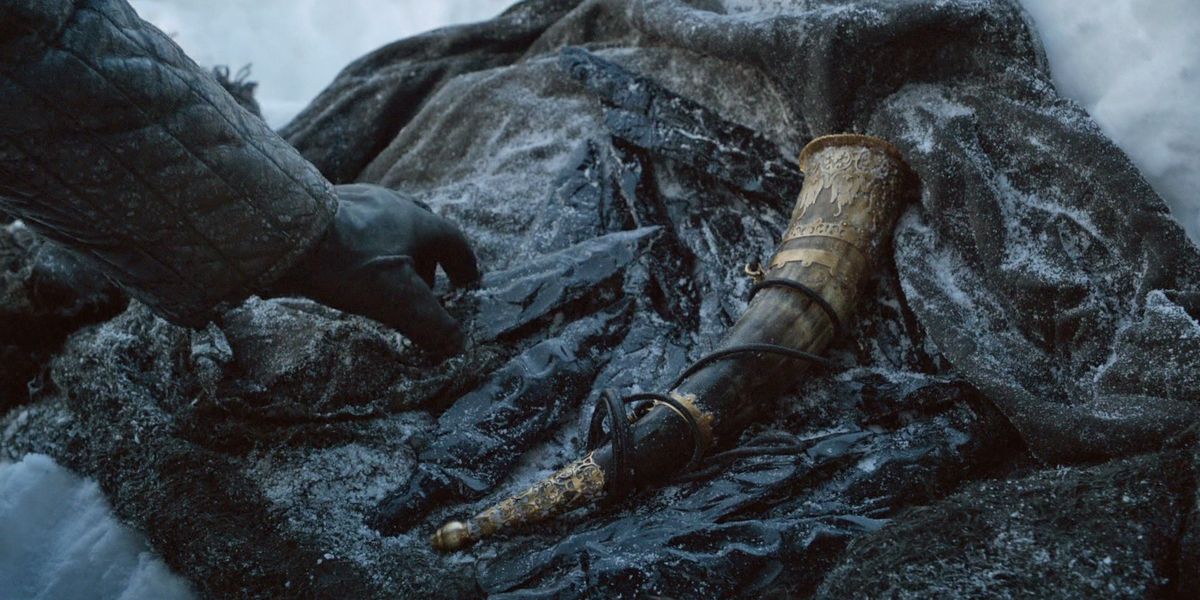WARNING: The following article contains spoilers for the Season 7 finale of Game of Thrones, which aired tonight on HBO.
The Wall has withstood eight millennia, assaults by wildlings and centuries of neglect, but as we saw in the Season 7 finale of Game of Thrones, it's no match for the Night King and his undead dragon.
Deep down, fans have known since 2011, when they first gazed upon the 700-foot-tall structure of ice and magic in the second episode, that the Wall would eventually fall. Like the promise of winter, its collapse was only a matter of time. It was Chekhov's gun on a grand scale, introduced early in the drama as the Seven Kingdoms' best defense against the threats of the Free Folk and, far more worrying, the White Walkers (or, to the minds of most Westerosi, "grumkins and snarks"); it had to falter. It was simply a matter of when and how, and who would be responsible.
The answers to the latter two questions emerged last week in "Beyond the Wall," when the Night King killed, and then resurrected, Daenerys' dragon Viserion. Forget fan theories about Bran's "mark" negating the wall's magical wards, or the Night King's army simply walking around it on a frozen Shivering Sea. In tonight's episode, "The Dragon and the Wolf," the Night King takes the most direct, and perhaps most crowd-pleasing, approach, melting part of the Wall with dragon fire.
We're left to wonder how the Night King planned to circumvent the Wall before Dany brought her dragons North to save Jon Snow's suicide squad (perhaps that's where the frozen sea depicted in the opening credits would've come into play). However, the more pressing question is what the destruction of the Wall, and the arrival of the army of the dead, means to the final season of Game of Thrones.
Over the course of the past seven seasons, we've seen the White Walkers and wights evolve from the stuff of nursery tales to the catalyst for Mance Rayder's attack on the Wall to an existential crisis for Westeros, far greater than the invading armies of Daenerys Targaryen. In "The Dragon and the Wolf," the army of the dead proves to be what Jon Snow had long hoped: the kind of "outside universal threat" that U.S. President Ronald Reagan imagined in 1987 as unifying the world toward a common goal, although he was talking about an alien invasion of Earth. Mind you, the White Walkers and their undead hordes are utterly alien to the people of the Seven Kingdoms, at least those outside of the North, old yarns sprang to horrifying life. Kind of like dragons.
Page 2: [valnet-url-page page=2 paginated=0 text='Cersei%27s%20Master%20Plan%20Has%20Major%20Flaws']
Will Cersei's Gamble Pay Off?
But if we've learned anything from Game of Thrones, it's that no threat is too great for Cersei to loosen her grip on power. Despite grudgingly committing her forces in a united fight against the armies of the dead, the current queen of the Seven Kingdoms soon reveals she has no intention of entering that war -- and it's doubtful that news of the Night King breaching the Wall will change that. Cersei orchestrated the destruction of the Great Sept of Baelor, which resulted in the deaths of untold thousands in King's Landing, to eliminate threats to the throne. Why should she be concerned about the potential slaughter of the North and the Targaryen army? The victor will be significantly weakened, meaning that no matter who loses, Cersei wins. At least in theory.
There are some 500 leagues, give or take, between Winterfell and King's Landing, during which much can happen in a war between the two current superpowers of Westeros -- Dany and her allies, and the Night King and his growing army, each side equipped with weapons of mass destruction. If the North, the Neck and the Vale fall in the process, so be it. By then, Euron will have returned with the thousands of sellswords of the Golden Company.
However, there are at least three significant flaws in Cersei's calculations, the first being that the Night King's army is forever growing. As the White Walkers have made their way from Beyond the Wall, they've accumulated virtually every once-living person, and more than a few animals (horses, an enormous bear, and a dragon), in their path. Armies fall before them, only to be resurrected within their ranks. That will continue as they overwhelm the Night's Watch and the Free Folk guarding the Wall, and cut a swath through the Gift on their way toward Winterfell. As with The Walking Dead, the threat of the zombie horde lies in its sheer unending numbers. How much of a dent dragon fire and dragonglass can make in that remains to be seen.
The second, and arguably more immediate, problem for Cersei may be relying on Euron Greyjoy to execute a key part of her plan. A notorious pirate who's spent his adult sailing (and raiding) the Known World, he seized the Salt Throne of the Iron Islands after murdering his older brother, and then declared his intention to conquer Westeros with Daenerys Targaryen as his wife. It was only when his niece and nephew, Yara and Theon, pledged themselves first to the Mother of Dragons that Euron allied himself with Cersei. Like her, he seeks power but also glory. His vision of the future surely isn't one in which he's the consort of the queen of the Seven Kingdoms and commander of its fleet. If Euron survives the attempt by Theon and the other ironborn to rescue Yara, what's to say he won't return to Westeros at the head of the Golden Company, thousands of mercenaries (presumably) secured by a loan from the Iron Bank? Euron has no loyalty to Cersei, leaving him more likely to invade King's Landing than defend it.
The third, and most emotionally resonate, flaw is Jaime Lannister, for whom Cersei's plan to rule the ashes of the Seven Kingdoms is (finally) a bridge too far. The Kingslayer who nonchalantly pushed a 10-year-old boy to his presumed death in Season 1 presumably now recognizes he's enabled the rise of a mad queen. As he turns his back on his sister and lover, he all but confirms the ascendant fan theory that Jaime, and not Tyrion, is the Valonqar ("little brother") prophesied to kill Cersei. But even if that does occur in the remaining six episodes of the series (and, come on, it's going to occur), it's difficult to see how Cersei's death might play into the war against the Night King. Although Cersei has never been loved by the people of Westeros, another count of regicide isn't going to endear Jaime to them; he isn't going to inspire the people of the south to offer themselves up as fodder for the army of the dead. It's also unclear how much good it would do to ride into battle with whatever remains of the Lannister forces.
Page 3: [valnet-url-page page=3 paginated=0 text='%20Wait%2C%20What%20About%20the%20Horn%20of%20Winter%3F']
Will Sam's Season 2 Discovery Come Roaring to the Rescue?
But if unified armies equipped with dragon fire and dragonglass aren't enough to stop the White Walkers and the coming of the new Long Night, then what is? That may be where the legendary Horn of Winter at last comes into play.
Looming large in George R.R. Martin's A Song of Ice & Fire novels, the Horn of Winter is said to have been used by Joramun, the King-Beyond-the-Wall who joined with Brandon the Breaker to defeat the Night's King, to wake giants from the earth. According to legend, it can destroy the Wall, which led many fans to speculate it would play a role in the army of the dead's grand entrance into the Seven Kingdoms. However, it's also been theorized that such a powerful device could be used against the White Walkers.
Seemingly forgotten by the show's producers, but certainly not some viewers, is the ancient warhorn discovered in Season 2 by Samwell Tarley in the Fist of the First Men, wrapped in a Night's Watch cloak with spear and arrow heads made of dragonglass (in the novels, it's Jon Snow who finds the cache). The dragonglass drew much of the attention, as Sam later used a spearhead to kill a White Walker, and Jon spent much of Season 7 seeking to mine the substance from beneath Dragonstone. But all this time, that broken warhorn has sat there, again like Chekhov's gun.
Granted, it may be a cheat for Sam to suddenly produce the warhorn after six seasons, but 1.) as we saw in last week's episode, Game of Thrones isn't above glossing over those "little" details (distance, the passage of time, where those enormous chains came from) for the sake of expedience; and 2.) relatively minor developments in those early seasons frequently foreshadowed much larger events.
While the Horn of Winter as deus ex machina might be a little difficult to stomach, there's no denying its use would be thematically powerful. Blowing the warhorn would potentially have two effects: to destroy the White Walkers and whatever remains of their army, and, if legend holds true, to bring down the Wall. With the specter of the Long Night gone, and the Free Folk at least allied with the Seven Kingdoms, if not exactly integrated into them, there's no need for the Wall (and even if there were, no one knows how to repair it). Its complete destruction as part of the defense of the Seven Kingdoms would signal the coming of a new age, of a united Westeros, without need for the Wall, or the Night's Watch, whose watch is truly ended.

